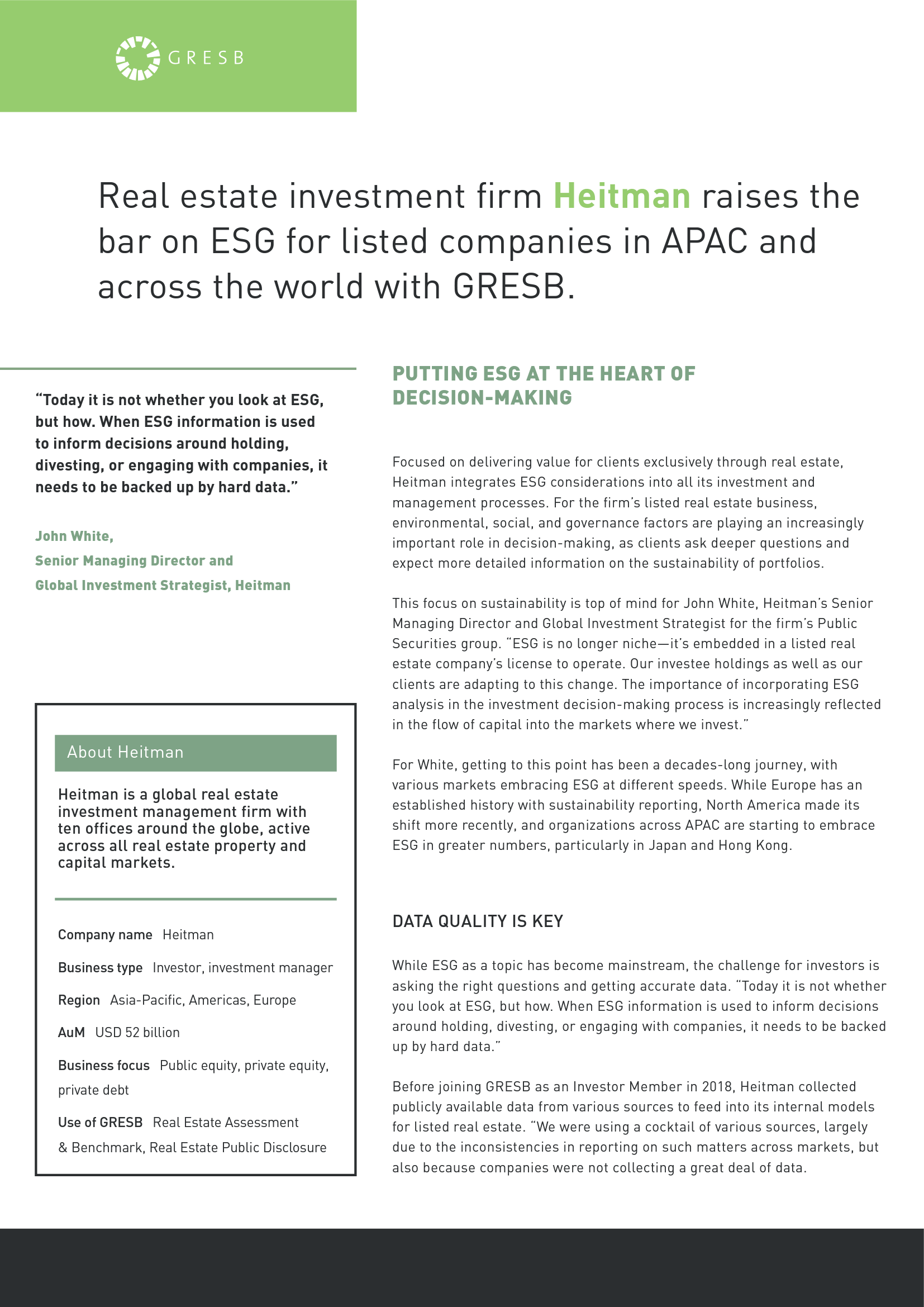Real estate investment firm Heitman raises the bar on ESG for listed companies in APAC and across the world with GRESB

Heitman is a global real estate investment management firm with ten offices around the globe, active
across all real estate property and capital markets.
Business type: Investor, investment manager
Region: Asia-Pacific, Americas, Europe
AuM: USD 52 billion
Business focus: Public equity, private equity, private debt
Use of GRESB: Real Estate Assessment & Benchmark, Real Estate Public Disclosure
Putting ESG at the heart of decision-making
Focused on delivering value for clients exclusively through real estate, Heitman integrates ESG considerations into all its investment and management processes. For the firm’s listed real estate business, environmental, social, and governance factors are playing an increasingly important role in decision-making, as clients ask deeper questions and expect more detailed information on the sustainability of portfolios.
This focus on sustainability is top of mind for John White, Heitman’s Senior Managing Director and Global Investment Strategist for the firm’s Public Securities group. “ESG is no longer niche—it’s embedded in a listed real estate company’s license to operate. Our investee holdings as well as our clients are adapting to this change. The importance of incorporating ESG analysis in the investment decision-making process is increasingly reflected in the flow of capital into the markets where we invest.”
For White, getting to this point has been a decades-long journey, with various markets embracing ESG at different speeds. While Europe has an established history with sustainability reporting, North America made its shift more recently, and organizations across APAC are starting to embrace ESG in greater numbers, particularly in Japan and Hong Kong.
Data quality is key
While ESG as a topic has become mainstream, the challenge for investors is asking the right questions and getting accurate data. “Today it is not whether you look at ESG, but how. When ESG information is used to inform decisions around holding, divesting, or engaging with companies, it needs to be backed up by hard data.”
Before joining GRESB as an Investor Member in 2018, Heitman collected publicly available data from various sources to feed into its internal models for listed real estate. “We were using a cocktail of various sources, largely due to the inconsistencies in reporting on such matters across markets, but also because companies were not collecting a great deal of data.
The gaps in available information didn’t provide the right insights for us,” said White. “GRESB provides the most comprehensive set of metrics for ESG in real estate. The data, coverage, and insights provided are highly detailed.”
Today Heitman uses GRESB to compare various REITs and companies against their peer groups, within a country, GRESB and listed performance benchmarks to find trends and outliers and to apply the data to further lines of questioning. The investment team is focused on catalyst investing, so a potential ESG shift from a low to a higher score can have a meaningful impact on a firm’s cost of capital as the universe of potential investors expands.
White uses GRESB data to engage directly with companies, whether they participate in the assessment or not. From a risk management perspective, outliers with low scores are subject to more scrutiny and need to show a pathway to improvement to be held in Heitman’s listed securities portfolios.
As an example, Heitman’s Global Prime strategy, with its ESG screening process, scored 9.9 points higher than the Global REIT index on GRESB’s Environmental Real Estate Assessment & Benchmark and 6.5 points higher on its overall score, with Scope 1 and 2 emission exposures around 2 percent
lower than the Global REIT benchmark.
“If a company isn’t already thinking about ESG, they’re lagging,” said White. “For example, if we ask a question on a social topic and management can’t satisfactorily answer—that raises red flags. What I would love to see is collateral in a REIT’s disclosure materials that shows if they report to the GRESB
benchmark, scope 1 and 2 emissions, what their commitment to net zero is, how they are tackling emission reduction. Transparency and consistency are key.”
A rising tide for ESG
Designed for the real estate sector, the GRESB Assessment and Benchmark drills down into some of the ESG topics that are most material for investors, facilitating a nuanced conversation. “The questions in the GRESB Assessment have helped investors think more deeply about the issues and the questions they should ask. Having peer market leaders to compare others against is very helpful. And the disclosures to GRESB have transformed how companies report on ESG, rising the tide for general disclosures across the sector.”
Getting started
So what should listed real estate companies be doing now? On this, White is clear: “Don’t wait until you’re in an engagement conversation to think about ESG. Focus on providing transparent data. In the United States, the SEC is putting regulations into ESG disclosures, the Government Pension Investment Fund of Japan expects ESG strategies from investee companies and its managers. In Europe, the region is already well ahead on SFDR regulation, imposing mandatory ESG disclosure obligations for asset managers. The investment markets have moved on. ESG is no longer a niche investment theme – it is mainstream.”